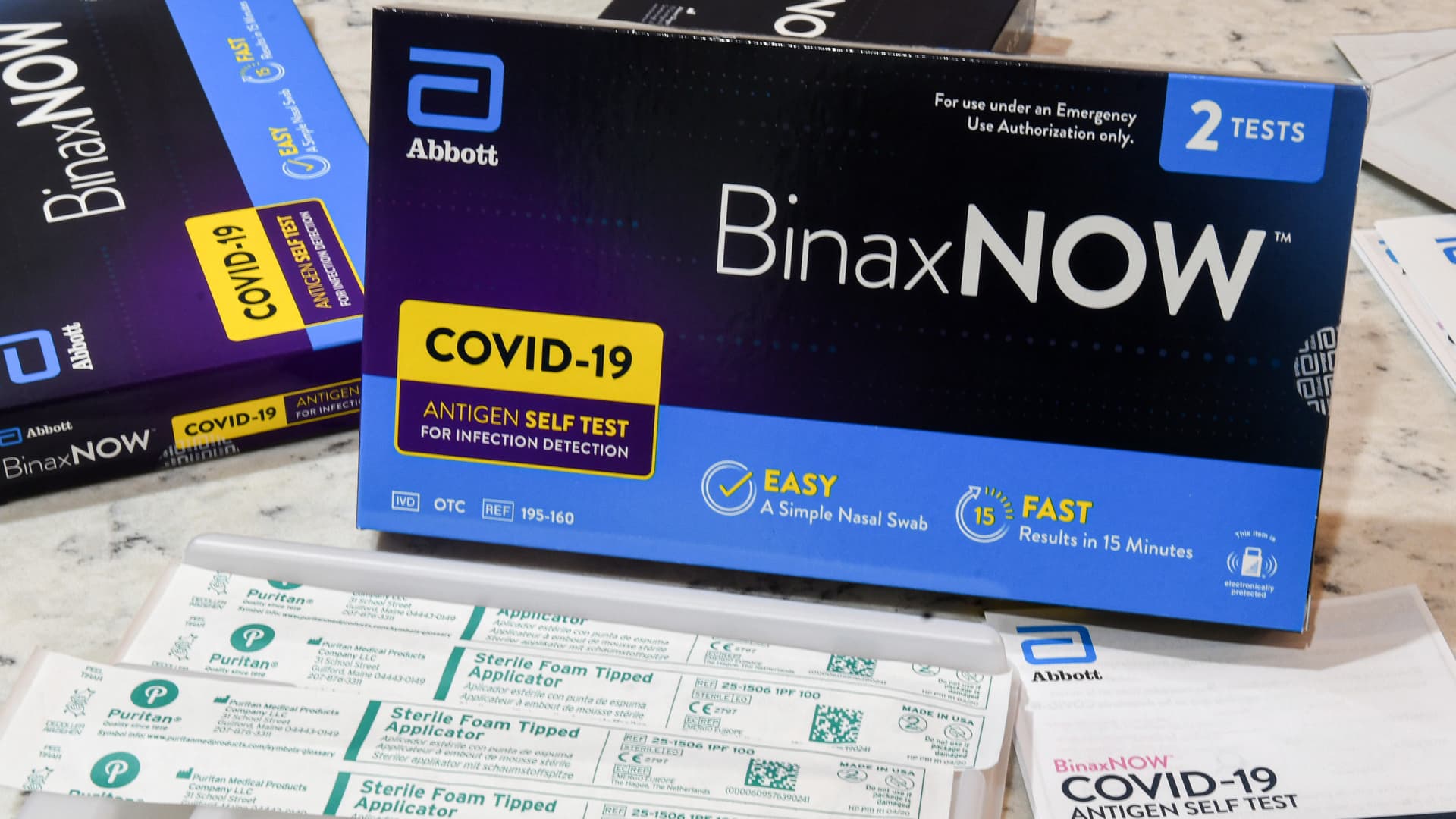In this photo illustration, Abbott’s at-home covid-19 rapid test kits are seen on display in Orlando.
Paul Hennessy | LightRocket | Getty Images
As Covid cases surge again in the U.S., Americans are digging out unused at-home tests that they stashed earlier on in the pandemic.
Many of those tests may have passed their expiration dates, but don’t throw them away just yet.
The Food and Drug Administration has extended the expiration dates of many popular at-home test products, which means some of your old kits may still be safe to use. You can check by visiting a page on the FDA’s website that lists expiration information for each test brand.
“That’s the first thing I would do before using an expired test or throwing it away,” Andrew Pekosz, a professor at the Johns Hopkins Bloomberg School of Public Health, told CNBC.
If the date has not changed, the FDA advises against using expired tests. Doing so increases the chance of an inaccurate test result, which could put your or another person’s health at risk.
A false result carries more risk again as Covid gains a greater foothold nationwide, primarily driven by newer variants of the virus like the now-dominant EG.5 strain, or “Eris.” Covid hospitalizations jumped nearly 19% last week, marking the sixth straight week of increasing admissions, according to the Centers for Disease Control and Prevention.
Public health experts say testing remains a critical tool for protection as Covid metrics climb. But lab PCR tests – the traditional way of detecting Covid – have become more expensive and less accessible for some Americans since the U.S. government ended the public health emergency in May.
The end of that declaration also changed how public and private insurers cover at-home tests, potentially leaving some people unable to get those tests for free through their plans. However, certain local health clinics and community sites still offer at-home tests to the public at no cost.
Before buying new at-home tests, it wouldn’t hurt to check if any expired ones sitting in your medicine cabinet are still safe to use. Here’s a walkthrough for how to do that, and everything else you need to know about these tests.
How to carefully check for extended expirations
The FDA website lists Covid test brands alphabetically in a table. Or, you can use a search box to find your test directly.
The FDA indicates whether each brand has an extended expiration date. It usually provides a link to a PDF with new expirations for specific test lots.
Find your test’s lot number – which is typically printed next to the expiration date on the packaging – and cross-reference it with the information on the PDF.
For example, a “BinaxNOW COVID-19 Ag Self Test” from lot number 181922 has a new expiration date of Oct. 11. That’s more than a year after its printed date of Sept. 11, 2022, extending the product’s total shelf life to 22 months.
The FDA extends expiration dates when a manufacturer provides data showing that its test’s shelf life is longer than what was known when the agency first approved the product.
“Expiration dates that were initially marked on these tests were sometimes very short because they were based on the available data at the time,” Pavitra Roychoudhury, a professor of laboratory medicine at the University of Washington School of Medicine, told CNBC. “But time has passed and more data has been gathered, so we can assess the stability and sensitivity of these tests over longer periods of time now.”
How at-home tests fare against new variants
The majority of at-home tests entered the market long before Eris and other new variants emerged in the U.S. But the FDA and experts say existing at-home tests detect Covid infections caused by those new strains, most of which are descendants of omicron.
“With EG.5, it’s very clear that at-home tests as well as many of the other tests that are done at medical institutions, hospitals and other places all recognize that and other currently circulating variants right now,” said Johns Hopkins’ Pekosz.
The FDA last week also said “existing tests used to detect and medications used to treat COVID-19 continue to be effective” with another omicron subvariant called BA.2.86, which has been detected in very small numbers across the U.S.
The CDC is tracking that variant because it has a high number of mutations that distinguish it from any other known strain of the virus. So far, there is no evidence that BA.2.86 causes more serious infections than other variants.
But recent studies from researchers in China and Sweden suggest that BA.2.86 could be less contagious and less immune-evasive than feared.
“Overall, it doesn’t appear to be nearly as extreme a situation as the original emergence of Omicron,” wrote Benjamin Murrell, principal researcher of the Sweden study, in a post on X.

